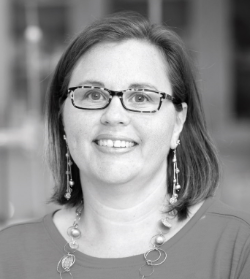Chemistry is a science that explores how matter interacts, combines and changes. As a chemist, I conduct experiments based on observations and careful planning that lead to quantifiable outcomes. I also know the classroom itself is a kind of laboratory—one that rewards thoughtful experimentation and innovation.
This year, our faculty began implementing a carefully constructed—and genuinely innovative—educational initiative: the Civitae (pronounced SIV-ih-tay) core curriculum.
A core curriculum is the academic work a university requires of all students regardless of major. At many institutions, it becomes simply a series of boxes to check, but Longwood has built something special. Developed over five years in consultation with faculty, students, alumni, business leaders and parents, Civitae will become central to our students’ experience. It affirms Longwood’s commitment to developing citizen leaders who are also prepared for a rapidly and ever-changing professional landscape.
The name Civitae translates essentially to “the course of the citizen leader.” Its “civic” root underscores Longwood’s mission. “Vitae”—familiar from the Latin phrase “curriculum vitae,” a standard synonym for résumé—reinforces that the curriculum serves as preparation for both a life and a career. Taken as a whole, Civitae helps students develop skills essential both to professional success and to engaged citizenship after college—skills in written and spoken communication, critical and creative thinking, problem solving, collaboration and reflection.
This year’s freshmen are the first to fully experience Civitae, though upperclassmen are also benefiting from many of the new courses. As the director of Civitae, I work closely with the faculty implementing this innovative approach. I have been impressed by their enthusiasm for bringing it to life.
Dr. Kris Paal, assistant professor of communication studies, describes the implementation of Civitae as a “massive task” for the faculty, but one that is “well worth the effort.”
“The focus on civic engagement and civil dialogue will empower students to see themselves as agents of change, transformation and even reconciliation in their respective communities,” he told me.Civitae builds throughout students’ time at Longwood. It starts freshman year with courses built to inspire curiosity and to equip students with foundational disciplinary knowledge while requiring them to practice a mode of communication (writing, speaking or artistic expression)—something employers say they highly value. Meanwhile, in addition to a Writing and Rhetoric course, all-first year students take an Inquiry into Citizenship course where they begin exploring civic issues in a disciplinary way. Examples of new courses include The Economically Informed Voter, and The Good, the Bad and the Inconsistent. All Citizenship classes ask students to identify and describe relationships between citizens’ individual rights and their broader responsibility to the common good.
Next comes a series of courses that challenge students to integrate knowledge and develop and articulate informed perspectives essential to participation in civic and global life.
Dr. David Shoenthal, a professor of mathematics who teaches an applied statistics course at this level of Civitae, explains how faculty translate this for students: “What skill set does a citizen leader who also happens to be a mathematician bring to bear on issues of the day, and how can that person work toward the common good both as an individual and as a member of a team? [Faculty] must implement strategies that motivate students to find creative and workable answers to those questions.”
Finally, a capstone course in the senior year entitled Symposium on the Common Good engages students in critical deliberations of the issues citizens face in their communities.
For me, what makes Civitae truly exceptional is how it brings to life Longwood’s mission of educating citizen leaders, which is so relevant to our time. And I’m not the only one who feels that way.
Dr. Evan Long, an assistant professor of education who just started his second year of teaching, believes Longwood’s mission “really does drive everything that happens here. As many of our nation’s citizens and leaders have become increasingly unable or unwilling to participate positively in civic life, Longwood’s mission is more important than ever before.”
As I look to the next few years, when today’s freshmen will walk across the stage at commencement having completed all of Civitae’s components, I feel immensely hopeful about the impact the curriculum will have had on them, and about the impact they will have in their communities and on our country.
About the Author

Dr. Melissa Rhoten
Dr. Melissa Rhoten, professor of chemistry, joined the Longwood faculty in 2000. She was named director of the new core curriculum in 2017.


Leave a Comment